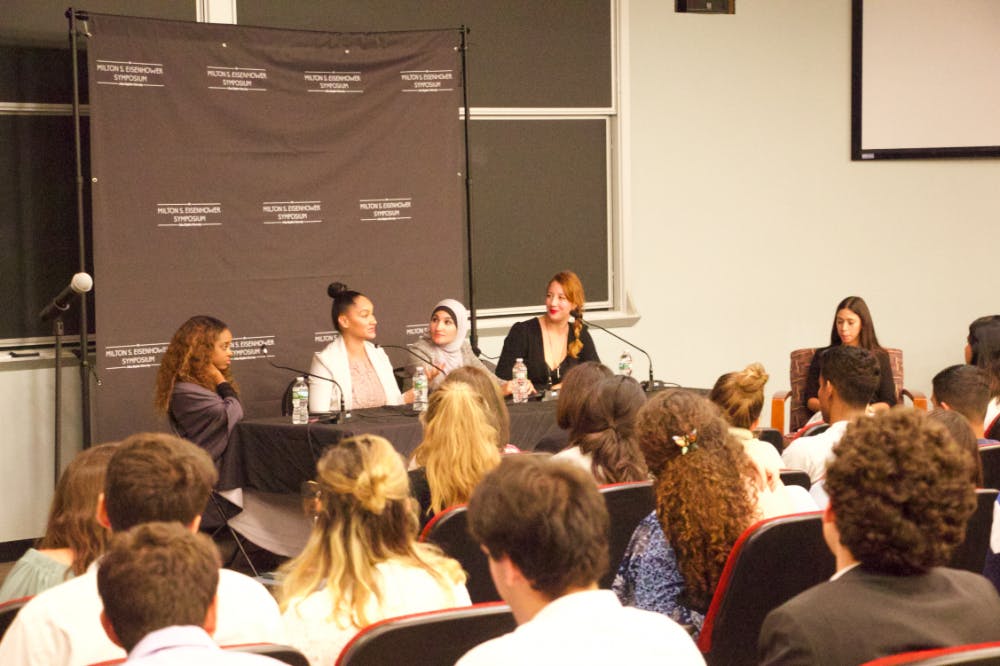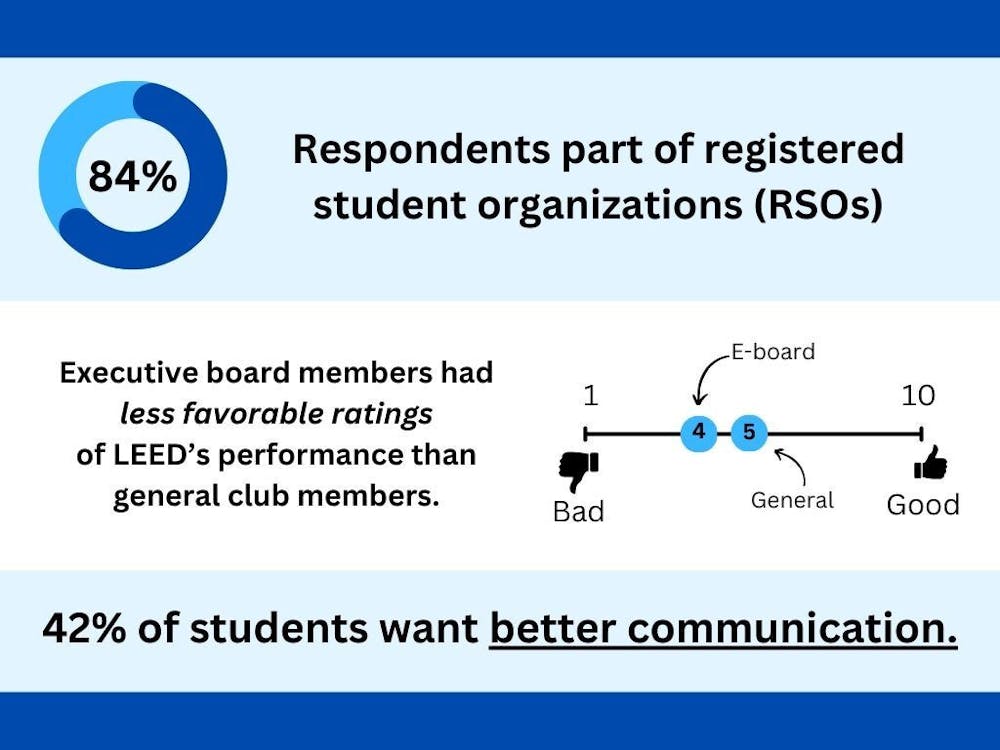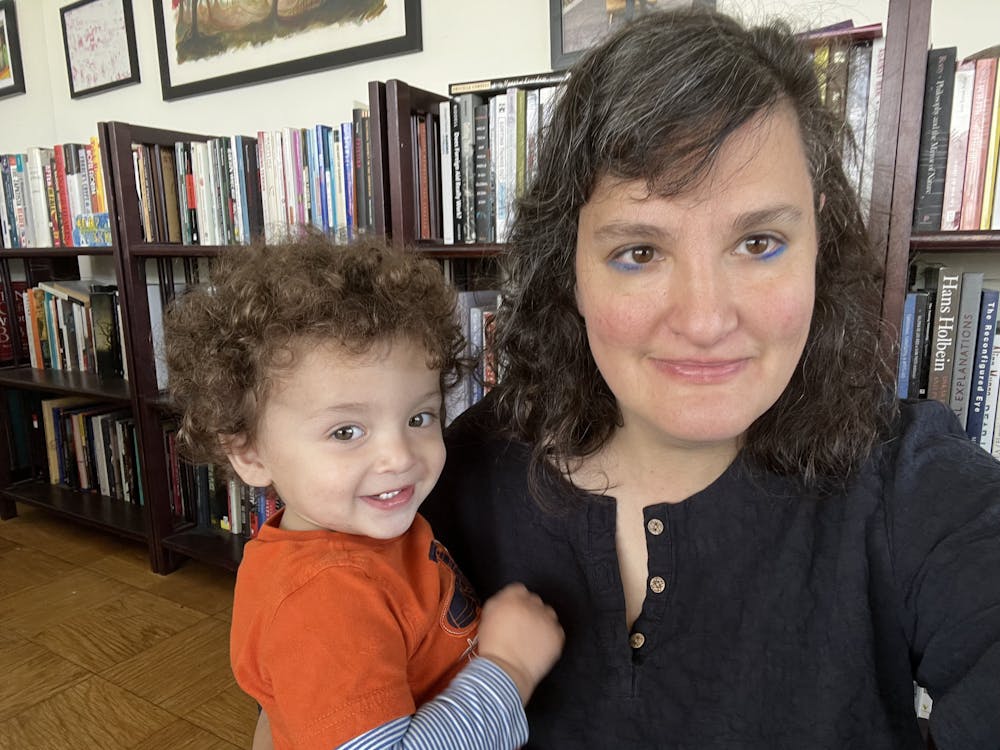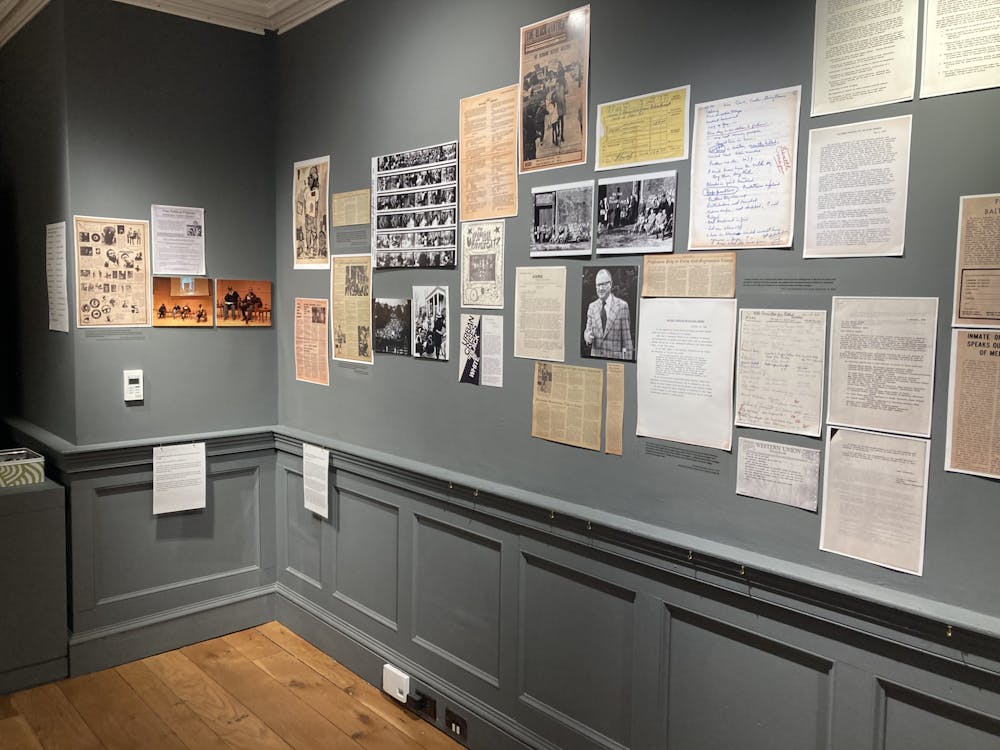The day after U.S. President Donald Trump’s inauguration, an estimated three to five million people participated in the Women’s March, the largest single-day demonstration in U.S. history.
Protesters gathered in cities around the world to support women’s rights, racial justice, LGBTQ rights and other causes.
Tamika Mallory, Bob Bland, Carmen Perez and Linda Sarsour, the organizers of the Women’s March, spoke as part of the Milton S. Eisenhower (MSE) Symposium speaker series on Monday.
They discussed their experiences organizing the demonstration and shared their thoughts on how individuals can continue to spark change in their communities.
Bland is the founder and CEO of Manufacture New York, a clothing company which promotes ethical practices and domestic production in the fashion industry. She said that she used Facebook to spread awareness about the Women’s March and to connect with other organizers and activists.
According to Bland, feedback on social media prompted them to focus on making the March more inclusive.
“We had thousands and thousands of comments from really passionate people. It was very overwhelming for the group of us that started it, but it was also necessary, because the March wouldn’t have fulfilled its potential promise if it hadn’t been for the points that came up,” she said.
Bland emphasized that the March’s success depended on a diverse representation of voices and perspectives.
“Everyone had to be there, and I think that that’s one of the key things for anyone who’s building any movement, any organization, any action,” she said. “You have to start with everyone around the table.”
Sarsour is an activist and the executive director of the Arab American Association of New York, an organization founded in the wake of the 9/11 attacks in order to support Arab-American families. She addressed the dangers of relying solely on social media to promote change.
“There were marches before there was social media,” Sarsour said. “Oftentimes what I see in this generation of activism is what I call ‘slacktivism.’ People think it’s all about the clicking and the retweets, and that’s important to put out a message, but it doesn’t actually build power, it doesn’t build influence and it doesn’t actually make change.”
The Women’s March was the largest demonstration in the city since protests against the war in Vietnam during the 1960s and 70s. Over 500 sister marches took place on all seven continents.
Mallory worked with the Obama administration on issues such as civil rights, health care, gun violence and police misconduct. She said that it was only after the March that organizers realized how many people around the world had engaged in the demonstration.
“I had no idea, and I know none of us did, that people had turned out in the way in which they did,” she said. “It was an incredible day that went beyond all of our expectations.”
She said that she was overwhelmed when she saw footage on the news from other places like New York City and London that had joined the March.
“We were having moments of just feeling so overwhelmed by the support and the people who actually came out not for us but for their issues, for their families,” Mallory said.
According to Sarsour, many were initially skeptical of the March’s chances for success.
She attributed the skepticism to sexism, saying that some people were skeptical as to whether four women would be able to organize the March.
“It was almost like people were sitting back waiting for us to fail,” she said. “We were not about to fail. Maybe we didn’t get the first woman president in November, but you better damn believe that women were going to lead the largest single-day protest in U.S. history, and that is exactly what we did.”
Perez is the executive director of The Gathering for Justice, a nonprofit which promotes civil and human rights. She discussed the importance of continuing the work of the Women’s March.
“Ask yourself what tugs at your heart,” she said. “What do you actually care about? And look for an organization and connect with some people who are also working on that issue.”
She urged audience members to start engaging in conversation with people of differing viewpoints, even if it is difficult.
“We want to feel safe in our communities, we want to go to schools that provide quality education, we want to take care of our families, but how we get there is sometimes different,” she said. “What I encourage is to have courageous conversations and to connect to each other’s humanity.”
During the question-and-answer session, one audience member asked Sarsour about controversial comments she has made in the past.
As a Palestinian-American, Sarsour has voiced support for taking actions such as boycotts and sanctions against Israel, which some believe to be anti-Semitic.
However, she has also supported a one-state solution in which Palestine and Israel may coexist and acknowledges Israel’s right to exist as a state.
In responding, Sarsour acknowledged the consequences of turning a blind eye towards anti-Semitism in this country, but added that she was tired of justifying her identity.
“It is not my job as a Palestinian Muslim-American woman to teach Jewish people or those that are pro-Israel that Palestinians too deserve dignity and self-determination and human rights,” she said.
She elaborated on the importance of different minority groups coming together to support one another.
“Sometimes you’ve got to show up in an organizing space that is not about you,” she said. “I am a Palestinian, Muslim-American woman with light skin, and I show up in a black spaces to organize about mass incarceration and the unarmed killing of black people.”
MSE Programming Chair Rachel Biderman said that although allegations about Sarsour’s anti-Semitism were taken into consideration when planning the Symposium, MSE chose to include her because of her status as a prominent activist.
“The MSE Symposium does not endorse the views of any of its speakers,” Biderman wrote in an email to The News-Letter. “The purpose of the symposium is to serve as a platform for free speech, where people with different perspectives can express themselves in a productive, thought-provoking manner.”
Despite criticism of Sarsour’s participation in the event, Biderman supported MSE’s decision to invite the organizers of the Women’s March to campus.
“As with many of our past speakers, we received criticism with our choices and this year’s lineup was no exception,” she wrote.
Biderman wrote that MSE welcomes opposing viewpoints and asked students to redirect criticisms toward speakers.
“We believe that as prominent leaders of our generation, the Women’s March organizers have important ideas to discuss... We appreciate any criticism but encourage those with these concerns to ask the speakers themselves.”
Biderman also explained that the speakers had brought their own security and that MSE was prepared for any unrest or protests at the event.
Junior Woudese Befikadu addressed the controversy surrounding Sarsour and previous alleged anti-Semitic comments.
“I don’t think her views are anti-Semitic,” Befikadu said. “She just said that she wants Palestinians to be recognized, and she even said they brought the Jewish community into the Women’s March.”
Befikadu said that she was studying abroad at the time of the Women’s March and was unable to demonstrate. She said that she was interested in the organizer’s efforts to include many different types of people.
“They answered the question about getting more men of color to get involved in feminism. It’s not the ‘struggle olympics.’ They also have their own struggles, but they can get more educated on feminism and sexism,” she said.
Freshman Clara Leverenz attended the Symposium because she attended the Women’s March in New York City and was interested in hearing from the organizers.
“It was probably one of the best days of my life... I kinda wanted the solidarity again,” she said.
The discussion panel inspired Leverenz to become more involved on campus.
“I liked what they were saying about the local level. We were thinking about having a follow-up discussion with the students. They were right — Hopkins isn’t very political,” she said.
Freshman Taylor Johnson, who also participated in the Women’s March, was inspired after hearing the organizers speak.
“I was really moved by the Women’s March, and I thought it would be really great to see some of the minds behind it, because I hadn’t heard much about the organization,” Johnson said.
Johnson was particularly interested in the organizers’ ideas for promoting change at a local level.
“They focused on affecting change at an individual level and starting conversations within your own community,” she said. “So many times you try to change as many minds as you can at once, but I thought that the individual level was a nice perspective. It was a new way of thinking about it.”
















Please note All comments are eligible for publication in The News-Letter.